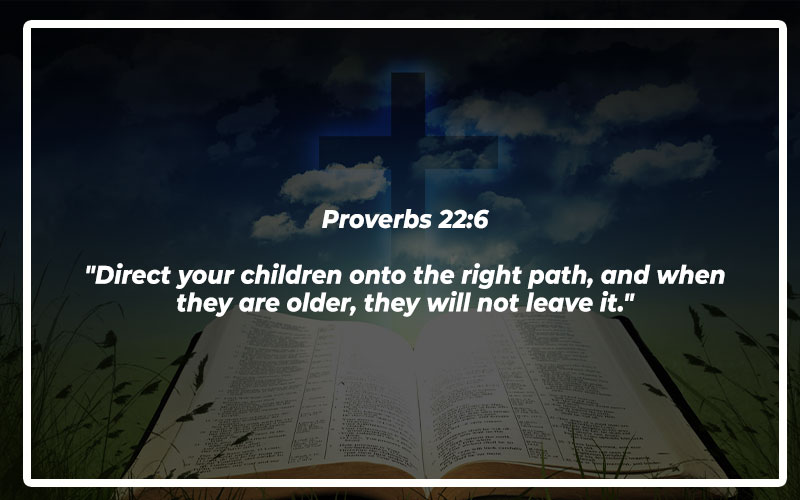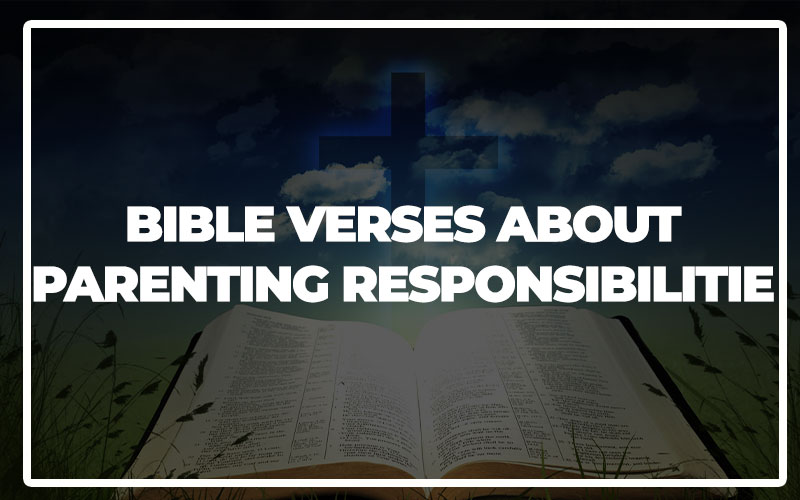Parenting is one of the most important roles given to us by God. As Christian parents, we have the responsibility to raise our children in a loving, nurturing environment, guiding them according to biblical principles.
The Bible provides wisdom and guidance on how to fulfill our parenting duties, emphasizing the importance of teaching, discipline, and love.
Here are key Bible verses that highlight the responsibilities of parents in raising their children in the faith.
Also Read: Bible Verses For New Parents
Top Bible Verses About Parenting Responsibilities
Proverbs 22:6
“Direct your children onto the right path, and when they are older, they will not leave it.”

This verse emphasizes the importance of guiding children from a young age. It underscores the role of parents in shaping their children’s values and behaviors, ensuring they follow a righteous path that will stay with them throughout their lives.
Deuteronomy 6:6-7
“And you must commit yourselves wholeheartedly to these commands that I am giving you today. Repeat them again and again to your children. Talk about them when you are at home and when you are on the road, when you are going to bed and when you are getting up.”
Parents are instructed to instill God’s commandments in their children consistently. This ongoing dialogue helps children internalize these teachings, making faith a central part of their daily lives.
Ephesians 6:4
“Fathers, do not provoke your children to anger by the way you treat them. Rather, bring them up with the discipline and instruction that comes from the Lord.”
This verse highlights the need for balance in parenting, combining discipline with love and guidance. It warns against harshness that can lead to resentment, advocating instead for nurturing children in a way that reflects God’s teachings.
Colossians 3:21
“Fathers, do not aggravate your children, or they will become discouraged.”
Similar to Ephesians 6:4, this verse advises parents to avoid behaviors that could dishearten their children. It encourages parents to foster an environment of encouragement and support to help children thrive.
Psalms 127:3
“Children are a gift from the Lord; they are a reward from him.”
This verse celebrates children as blessings from God. It serves as a reminder to parents to cherish their children and recognize them as divine gifts, warranting love and responsible care.
Proverbs 29:17
“Discipline your children, and they will give you peace of mind and will make your heart glad.”
Effective discipline is portrayed as beneficial not only for children but also for parents. Proper guidance and correction lead to well-behaved children, resulting in a harmonious family life and parental joy.
Proverbs 13:24
“Those who spare the rod of discipline hate their children. Those who love their children care enough to discipline them.”
This verse emphasizes the necessity of discipline as an act of love. It asserts that withholding discipline is harmful, while correcting children is a vital aspect of loving and caring for them.
1 Timothy 5:8
“But those who won’t care for their relatives, especially those in their own household, have denied the true faith. Such people are worse than unbelievers.”
Paul stresses the importance of familial responsibility. Parents are called to provide and care for their families, linking this duty directly to the authenticity of their faith.
Titus 2:4
“These older women must train the younger women to love their husbands and their children.”
Intergenerational teaching is highlighted, with older women guiding younger women in their familial roles. This mentorship helps ensure that love and responsible parenting are passed down through generations.
Proverbs 19:18
“Discipline your children while there is hope. Otherwise, you will ruin their lives.”
Early discipline is encouraged to steer children away from destructive paths. The verse underscores the long-term benefits of correcting children’s behavior at a young age.
Hebrews 12:7
“As you endure this divine discipline, remember that God is treating you as his own children. Who ever heard of a child who is never disciplined by its father?”
This verse likens God’s discipline to that of a loving parent, emphasizing that correction is a sign of belonging and care. It reassures parents that disciplining their children is an essential aspect of their growth and development.
Exodus 20:12
“Honor your father and mother. Then you will live a long, full life in the land the Lord your God is giving you.”
This commandment highlights the reciprocal relationship between parents and children. It underscores the importance of respect and honor within the family, promising blessings for those who uphold these values.
Proverbs 23:13
“Don’t fail to discipline your children. The rod of punishment won’t kill them.”
Parents are encouraged to discipline their children, reassuring them that correction is necessary and beneficial for the child’s growth. It advocates for proactive parenting to guide children properly.
2 Timothy 3:14-15
“But you must remain faithful to the things you have been taught. You know they are true, for you know you can trust those who taught you. You have been taught the holy Scriptures from childhood, and they have given you the wisdom to receive the salvation that comes by trusting in Christ Jesus.”
Paul emphasizes the lifelong impact of early religious education. The verse encourages parents to teach their children the Scriptures, ensuring they grow up with a solid foundation of faith and wisdom.
Also Read: Bible Verses About Parents Love
Luke 2:52
“Jesus grew in wisdom and in stature and in favor with God and all the people.”
Jesus’ growth in various aspects of life serves as a model for parenting. It highlights the importance of holistic development, encompassing wisdom, physical growth, and spiritual favor.
Joshua 24:15
“But if you refuse to serve the Lord, then choose today whom you will serve. Would you prefer the gods your ancestors served beyond the Euphrates? Or will it be the gods of the Amorites in whose land you now live? But as for me and my family, we will serve the Lord.”
Joshua’s declaration reinforces the role of parents in leading their families in faith. It underscores the commitment to serving God as a collective family unit, setting a spiritual example for children.
Isaiah 54:13
“I will teach all your children, and they will enjoy great peace.”
God’s promise to teach children highlights the divine partnership in parenting. It reassures parents that God’s guidance will bring peace and well-being to their children.
3 John 1:4
“I could have no greater joy than to hear that my children are following the truth.”
John expresses the joy parents feel when their children live according to truth and faith. It emphasizes the fulfillment and happiness that comes from seeing children embrace and uphold their teachings.
Matthew 19:14
“But Jesus said, ‘Let the children come to me. Don’t stop them! For the Kingdom of Heaven belongs to those who are like these children.'”
Jesus’ welcoming of children highlights their value in God’s eyes. It encourages parents to bring their children to faith, acknowledging their inherent worth and potential within God’s kingdom.
Proverbs 20:7
“The godly walk with integrity; blessed are their children who follow them.”
This verse connects parental integrity with blessings for children. It underscores the impact of a parent’s righteous living on their children, encouraging parents to lead by example.
Genesis 18:19
“I have singled him out so that he will direct his sons and their families to keep the way of the Lord by doing what is right and just. Then I will do for Abraham all that I have promised.”
God’s choice of Abraham underscores the responsibility of parents to guide their families in righteousness. It highlights the importance of teaching children to follow God’s ways, ensuring the fulfillment of divine promises.
Psalm 78:4
“We will not hide these truths from our children; we will tell the next generation about the glorious deeds of the Lord, about his power and his mighty wonders.”
Parents are encouraged to share God’s works with their children. This verse emphasizes the importance of passing down stories of faith and God’s miracles, ensuring that future generations remain connected to their spiritual heritage.
1 Corinthians 11:1
“And you should imitate me, just as I imitate Christ.”
Paul’s call to imitation serves as a model for parental behavior. Parents are encouraged to live in a way that reflects Christ, providing a clear and righteous example for their children to follow.
1 Peter 5:2-3
“Care for the flock that God has entrusted to you. Watch over it willingly, not grudgingly—not for what you will get out of it, but because you are eager to serve God. Don’t lord it over the people assigned to your care, but lead them by your own good example.”
Peter’s advice to church leaders is equally applicable to parents. It emphasizes the importance of caring for and guiding those in their charge with humility and a willing spirit, setting a positive example through their own actions.
Philippians 4:9
“Keep putting into practice all you learned and received from me—everything you heard from me and saw me doing. Then the God of peace will be with you.”
Paul encourages believers to practice what they have learned from him. This verse highlights the importance of parents living out their teachings, demonstrating consistency and faith in action for their children.
James 1:5
“If you need wisdom, ask our generous God, and he will give it to you. He will not rebuke you for asking.”
Parents are reminded to seek God’s wisdom in their parenting. This verse reassures them that God is willing to provide the guidance they need, encouraging them to rely on divine support in their responsibilities.
Romans 12:12
“Rejoice in our confident hope. Be patient in trouble, and keep on praying.”
Parents are encouraged to maintain hope, patience, and prayerfulness. This verse underscores the importance of a strong spiritual foundation, especially during challenging times in parenting.
2 Corinthians 12:9
“Each time he said, ‘My grace is all you need. My power works best in weakness.’ So now I am glad to boast about my weaknesses, so that the power of Christ can work through me.”
This verse reassures parents that God’s grace is sufficient in their weaknesses. It encourages them to rely on God’s strength, acknowledging that His power is most evident in their moments of vulnerability.
Galatians 6:9
“So let’s not get tired of doing what is good. At just the right time we will reap a harvest of blessing if we don’t give up.”

Parents are encouraged to persevere in their good efforts. This verse promises a harvest of blessings for those who remain steadfast, reminding parents that their labor and dedication will yield positive outcomes.
Isaiah 40:31
“But those who trust in the Lord will find new strength. They will soar high on wings like eagles. They will run and not grow weary. They will walk and not faint.”
Parents are assured of renewed strength through their trust in the Lord. This verse provides encouragement and hope, reminding them that God will sustain them through the demands of parenting.
Psalm 103:13
“The Lord is like a father to his children, tender and compassionate to those who fear him.”
This verse likens God’s compassion to that of a loving father. It serves as a model for parents to emulate God’s tenderness and compassion in their relationships with their children.
Proverbs 3:5-6
“Trust in the Lord with all your heart; do not depend on your own understanding. Seek his will in all you do, and he will show you which path to take.”
Parents are encouraged to trust in God’s guidance rather than relying solely on their understanding. This verse reassures them that seeking God’s will in all aspects of parenting will lead to the right path.
Jeremiah 29:11
“‘For I know the plans I have for you,’ says the Lord. ‘They are plans for good and not for disaster, to give you a future and a hope.'”
God’s promise of a hopeful future provides reassurance to parents. This verse encourages them to trust in God’s plans for their children, instilling confidence and hope in their parenting journey.
Matthew 7:11
“So if you sinful people know how to give good gifts to your children, how much more will your heavenly Father give good gifts to those who ask him.”
Jesus highlights the goodness of earthly parents as a reflection of God’s greater goodness. This verse encourages parents to give generously to their children, mirroring the generosity of their heavenly Father.
Also Read: Bible Verses About Parents Being Wrong

